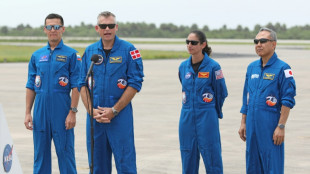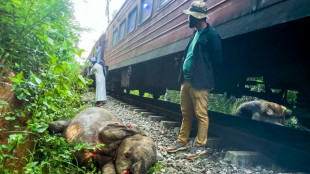
-
 Female chefs condemn sexism in British kitchens
Female chefs condemn sexism in British kitchens
-
US, China economic leaders raise 'serious concerns' in first call

-
 Russia sells famed imperial prison at auction
Russia sells famed imperial prison at auction
-
Stock markets rise as Alibaba fuels Hong Kong tech rally

-
 France full-back Jaminet returns to rugby after racist video ban
France full-back Jaminet returns to rugby after racist video ban
-
Chinese AI companies celebrate DeepSeek, shrug off global curbs

-
 Asian markets advance as Alibaba fuels Hong Kong tech rally
Asian markets advance as Alibaba fuels Hong Kong tech rally
-
Nissan shares jump 11% on reported plan to seek Tesla investment

-
 Trump aid cut imperils water scheme in scorching Pakistan city
Trump aid cut imperils water scheme in scorching Pakistan city
-
Just 17% of Japan citizens hold passport, data shows

-
 Most Asian markets rise as traders pick over week of headlines
Most Asian markets rise as traders pick over week of headlines
-
Japan's core inflation rate hits 19-month high

-
 How a 'forgotten' Minnesota monastery inspired 'The Brutalist'
How a 'forgotten' Minnesota monastery inspired 'The Brutalist'
-
Japan's core inflation rate hits 3.2% in January

-
 Stocks mostly fall on tepid Walmart outlook, geopolitical worries
Stocks mostly fall on tepid Walmart outlook, geopolitical worries
-
Musk in X spat with Danish astronaut over 'abandoned' ISS crew

-
 Bond franchise shake-up moves spy into Amazon stable
Bond franchise shake-up moves spy into Amazon stable
-
New York seeks hundreds of millions of dollars in 'vaping epidemic' case

-
 Moon or Mars? NASA's future at a crossroads under Trump
Moon or Mars? NASA's future at a crossroads under Trump
-
Spotify adds more AI-generated audiobooks

-
 Stocks in the red as investors worry about growth and inflation
Stocks in the red as investors worry about growth and inflation
-
Bond franchise shifts to Amazon as Broccoli family steps back

-
 Unfair? Figures belie Trump's claims on EU trade balance
Unfair? Figures belie Trump's claims on EU trade balance
-
Stock markets mostly lower on Fed concerns over Trump policies

-
 France moves to ban marriage for undocumented migrants
France moves to ban marriage for undocumented migrants
-
Walmart sales rise but shares tumble on forecast

-
 Spain court convicts ex-football chief for sexual assualt over forced kiss
Spain court convicts ex-football chief for sexual assualt over forced kiss
-
Mercedes-Benz flags cost cuts, tough year ahead after torrid 2024

-
 ECB rate hikes result in record loss in 2024
ECB rate hikes result in record loss in 2024
-
Romanian director Jude shoots latest film in 10 days on an iPhone

-
 Sri Lanka passenger train kills six elephants
Sri Lanka passenger train kills six elephants
-
Stock markets mixed on Fed concern over Trump policies

-
 Birkenstock sandals are not art, German court rules
Birkenstock sandals are not art, German court rules
-
Markets drop, gold hits record on Fed concern over Trump policies

-
 Airbus profit climbs in 2024, aims to accelerate output
Airbus profit climbs in 2024, aims to accelerate output
-
Airbus proft climbs in 2024, aims to accelerate output

-
 Trump says trade deal with China 'possible'
Trump says trade deal with China 'possible'
-
Northern Japan snowed under after two-week whiteout

-
 Mercedes-Benz profits plunge as German carmakers reel
Mercedes-Benz profits plunge as German carmakers reel
-
'We will save them': The quest to rescue nearly extinct rhino

-
 Berlin film festival nurtures portraits of messy motherhood
Berlin film festival nurtures portraits of messy motherhood
-
Renault revs up profitability in 2024

-
 Japan's trade minister arranging US trip: reports
Japan's trade minister arranging US trip: reports
-
Eyeing China and US, EU hopes clean tech boost will spark growth

-
 Trump considering 'alternatives' to Boeing for Air Force One contract
Trump considering 'alternatives' to Boeing for Air Force One contract
-
Afghanistan problem 'can be solved': former women's affairs minister

-
 Lights out for Indonesia civil servants as Prabowo cuts budgets
Lights out for Indonesia civil servants as Prabowo cuts budgets
-
London Fashion Week launches with ode to gender fluid designs

-
 Asian markets drop as Fed flags concern over Trump policies
Asian markets drop as Fed flags concern over Trump policies
-
Heated immigration debate complicates Germany's search for workers

| RBGPF | 3.53% | 67.22 | $ | |
| GSK | -0.29% | 36.455 | $ | |
| SCS | -0.81% | 12.33 | $ | |
| BP | -0.66% | 33.945 | $ | |
| NGG | 0.05% | 61.13 | $ | |
| BTI | -2.42% | 37.64 | $ | |
| AZN | 1.02% | 74.265 | $ | |
| CMSD | 0.04% | 23.48 | $ | |
| RIO | -0.29% | 64.105 | $ | |
| RELX | -1.98% | 49.431 | $ | |
| BCE | 0.51% | 23.69 | $ | |
| JRI | -0.05% | 12.814 | $ | |
| BCC | -3.3% | 112.758 | $ | |
| CMSC | 0.11% | 23.425 | $ | |
| VOD | 1.02% | 8.345 | $ | |
| RYCEF | -1.03% | 7.75 | $ |

Blinded Ukrainian soldiers face new challenges at home
At a medical centre in Kyiv, former soldier Dmytro Gorodynsky shuffled around to the funky notes of the 1970s hit "Le Freak", his eyes obscured by sunglasses.
The 39-year-old lost his eyesight in a Russian drone attack five months ago.
Now in rehabilitation, he is adjusting to the life-changing injury by learning dance steps as a way to improve his sense of balance and space.
Many of those returning blind from the front face challenges adapting to daily life, ignored by fellow citizens while facing difficulty accessing specialist care.
There are no official statistics on the number of blind veterans in Ukraine.
But in 2023, the UN warned that the war had led to a "concerning rise" in vision problems among the population as a whole.
Strained by Russia's invasion, Ukraine's healthcare system is not yet adapted to treat the newly blind, said Olesya Perepechenko, director of NGO Contemporary View, which helps blinded ex-soldiers.
Sometimes no one at the hospital teaches them how to use the toilet, she told AFP.
- 'Panic sets in' -
Gorodynsky, wearing military fatigues, smiled wistfully as he danced at Trinity Hub in Kyiv, a rehabilitation centre for the visually impaired.
In the first few weeks after his injury, he said, he would get lost and "panic sets in".
He had to ask for help for "basic things", he told AFP, with a pang of frustration in his voice.
But after two months of daily visits to the centre, where he is also learning to read Braille and use his phone, Gorodynsky has noticed progress.
"It gives us confidence and makes us want to keep living," Gorodynsky said.
He also said he will be able to stay in his career, a rarity for those blinded by injury.
A glass fitter before the war, he will now be responsible for glass repair.
Sometimes, his friends and family still hand him their mobile phones to show him a photo, he said.
This was hurtful at first, but he now realises: "They forget that I have this problem."
- 'Who would want me as a burden?' -
At the other end of the corridor, Mykola Kazyuk was practising using a computer.
"Move your right hand," his teacher, Oleksandr Gordiyko told him. His 48-year-old pupil, who will soon have gone a year without sight, complained that he had hit the wrong key again.
"These are probably our most challenging rehabilitation patients. It's not common for someone to lose their sight so suddenly and quickly," Gordiyko said.
Unlike those who gradually lose their sight through illness, soldiers have no time to prepare.
Learning how to make a coffee or take the bus has been frustrating for Kazyuk, who sighs just thinking about it.
"I have to, so that I don't become a vegetable," he said.
The ex-military man was disfigured and wounded in the legs while fighting at the front in April 2024.
When he woke up after a month in a coma, he realised he was blind.
With his white cane in his hand, Kazyuk initially thought he would be abandoned.
"Who would want me as a burden?" he said.
But little by little, with the support of his wife, he is regaining his independence. And he is proud to say that he can now bake cupcakes and sew on buttons.
- Is Ukraine ready? -
A former sapper in the army, Vladyslav Yeshchenko was blinded while clearing mines near the war-torn city of Bakhmut two and a half years ago.
To help others who have lost eyesight, the 26-year-old founded Let's See The Victory, another non-profit group.
In his living room, decorated with a Braille Playboy poster, he said the hardest part of going blind was accepting that his eyes, destroyed by a large mine explosion, were "not there any more", with no hope of ever being treated.
He also had to come to terms with the fact he would no longer be of "any use" on the battlefield.
After a period of angry outbursts and sleepless nights, he said it was his work with veterans that helped him feel useful again.
He believes Ukraine is not ready to welcome the newly blind.
Efforts are needed to improve accessibility, as well as to raise awareness among sighted people, who tend to ignore the issue, Yeshchenko said.
So sometimes he teases them a little.
Recently, when his neighbours complained that they could not see in the dark during power cuts sparked by Russian strikes, he joked: "How are you doing, losers?"
J.Bondarev--CPN
